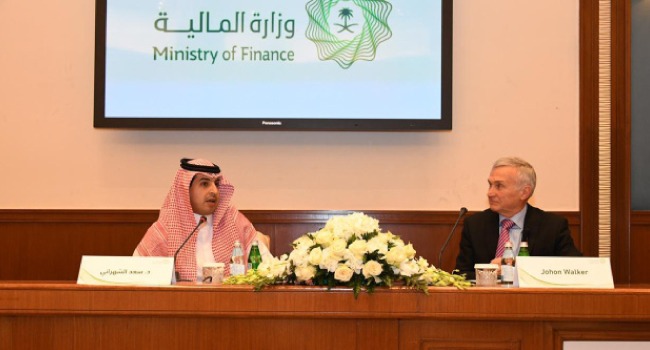Publisher: Maaal International Media Company
License: 465734
On behalf of the Minister of Finance Mohammed bin Abdullah Al-Jadaan, the head of the steering committee in the ministry Abdulaziz bin Saleh Al-Fraih inaugurated the “Budget 2022” forum in its third edition, in the presence of a number of officials of the ministry government agencies and the private sector.
In his opening speech to the forum, Al-Fraih explained that the forum comes as an extension of previous meetings aimed at informing government officials on the developments of the budget preparation journey and achieving higher efficiency and effectiveness, preparing it as well as the ability to manage it and control implementation, in line with the objectives of government agencies.
He stated that the state’s general budget has become characterized by participatory planning between government agencies, noting that since 2017, work has been done on redesigning and developing the method of preparing the budget, and that the ministry had a clear will and vision regarding what the budget preparation methodology and requirements should be, pointing out that it was targeting several components of the general framework for the development of budget preparation, the first of which is participatory work with government agencies, so that there is continuous interaction between the requesting agencies and the Ministry of Finance, in preparing the annual budget, and secondly, to evoke the support requirements that must be provided to government agencies to enable them to formulate budget requirements, in an appropriate manner through which they achieve their objectives.
اقرأ المزيد
The third, evoke the challenges and lessons that emerge during the implementation of the improvements, and re-evaluate the preparation methodology and continue to improve it.
“During 2021, we launched the Financial Skills Center to support the development of skills and capabilities I,n the public financial sector, taking into account the urgent need to bridge knowledge and skills gaps, in order to achieve appropriate harmony in all business streams between service providers, such as the Ministry of Finance and their beneficiaries in government agencies, Al-Fraih said.
It is expected that the medium-term financial planning program will have a direct and significant impact on improving the budget preparation cycle, given that the budget design will not be limited to a short cycle of 12 months, with its challenges in the ability to achieve appropriate support for the stability of projects and spending requirements whose cycle exceeding more than a year.
He pointed out that the shift to accounting accrual is a basic basis to enable the government not only to monitor and account for its financial operations, in a way that enables the preparation of its financial position, but also goes beyond that to be a tool for performance management and evaluation.
With regard to the technical capabilities side, he explained that there has become a large package of technical solutions that go beyond the channel of registration and raising of contracts and claims through a accreditation platform, which includes a set of analytical tools represented in reporting services and indicators that give all solutions and elements, including contracts, payments, exchange and competitions, indicating that these tools are not only available to follow up the operational performance, but also to perform all the analyzes required in preparing the annual budget, stressing that the ministry is now able, through the approval platform, to view all information related to the budget within a few minutes, and that the digital transformation has enabled to raise the level of harmony between the government and the private sector.
The main dialogue session of the forum entitled “Financial Sustainability and Medium-Term Financial Planning” witnessed the discussion of the Assistant Minister for Financial Policies and International Relations, Chairman of the Preparatory Committee for the Financial Sustainability Program Committee Abdulaziz Al-Rasheed, Assistant Minister for Financial Affairs Yasser Al-Quhaidan, and Undersecretary of the Ministry of Economy and Planning for Policies and Economic Planning Ayman Afghani.
The objectives of financial sustainability and medium-term financial planning and its link to the national economy, as well as its relationship to the current economic challenges and aspirations in the Kingdom and the world, in addition to its role in empowering the private sector and achieving economic growth, with reference to the goal of the financial sustainability program in separating public finances from fluctuating oil prices, with establishing a framework for the structure of non-oil revenues to be linked with the economy, as well as talking about the importance of stabilizing public finance performance over stabilizing economic performance.
In the “electronic contract and payment of dues, according to their deadlines” session, the Undersecretary of the Ministry of Municipal and Rural Affairs and Housing for Administrative, Financial and Budgetary Affairs Omar Al-Mahasin, and the Undersecretary of the Ministry of Finance for the General Budget Haitham Al-Tareef discussed the challenges and gaps faced by the private sector in obtaining financial dues according to their deadlines, as well as solutions.
The government is working to implement them, and they also talked about the impact of technical systems and artificial intelligence on controlling the purchase-to-payment cycle.
The “Capacity Building” session, which was attended by the CEO of the Financial Skills Center Faisal Jado, the Ministry of Finance’s Assistant Undersecretary for Budget Ali Al-Yabis, and the Ministry of Finance’s Assistant Undersecretary for Revenue Policies and Governance, Muhammad Al-Qarni, reviewed the role of the Financial Skills Center in building plans and initiatives in the public financial sector and developing Regulations and policies, the role of the budget ambassadors program in preparing and implementing the budget, in addition to the impact of the revenue ambassadors program in the effective management of financial resources.
The “Financial Systems and Data” session dealt with reports and indicators services systems, revenue and collection, as well.








